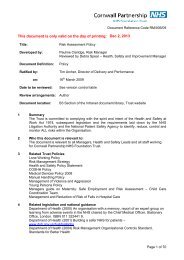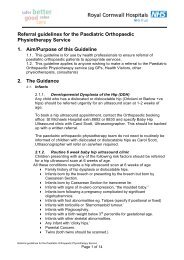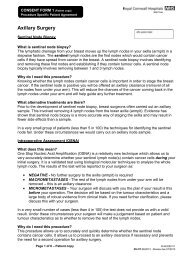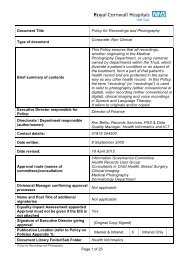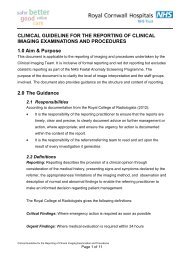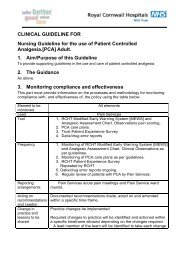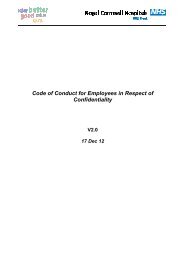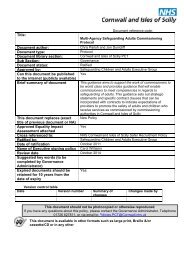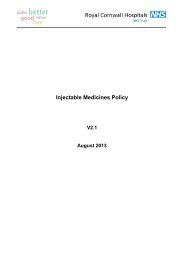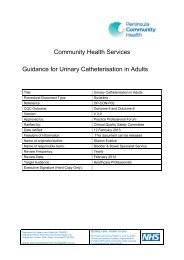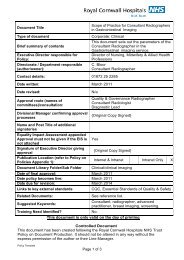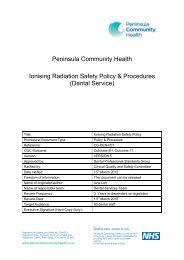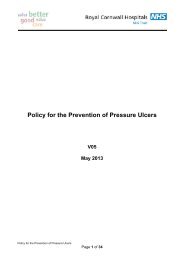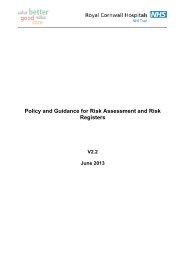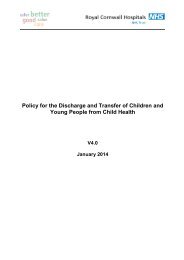Incident Management Policy Including Serious Incidents Requiring ...
Incident Management Policy Including Serious Incidents Requiring ...
Incident Management Policy Including Serious Incidents Requiring ...
You also want an ePaper? Increase the reach of your titles
YUMPU automatically turns print PDFs into web optimized ePapers that Google loves.
Category 0 1 2 3 4 5Impact No significantreflection onany individualor body.Media interestvery unlikely.Damage to anindividual’sreputation.Possiblemedia intereste.g. celebrityinvolvedDamage toa team’sreputation.Some localmediainterest thatmay not goDamage to aservicesreputation.Local low keymediacoverage.Damage to anorganisation’sreputation.Local mediacoverage.Damage toNHSreputation.NationalmediacoverageMinor breachofconfidentiality.Only a singleindividualaffected.Potentiallyseriousbreach. Lessthan 5 peopleaffected orrisk assessedas low e.gfiles wereencryptedpublic<strong>Serious</strong>potentialbreach andriskassessedhigh e.g.unencryptedclinicalrecords lost,up to 20peopleaffected.<strong>Serious</strong>breach ofconfidentialitye.g up to 100peopleaffected<strong>Serious</strong> breachwith eitherparticularsensitivity e.g.sexual healthdetails, or up to1000 peopleaffected.<strong>Serious</strong>breach withpotential forID theft orover 1000peopleaffected.Health Protection (Major Outbreaks/<strong>Serious</strong> <strong>Incident</strong>s of Communicable Disease)Any circumstance which necessitates the action of an NHS Trust, Primary Care Trust orwider community in relation to a major outbreak or serious incident of a communicabledisease. This includes:outbreaks of infection which involve presumed transmission within hospital(acute, community) and:cause significant morbidity/mortality such as salmonella outbreak in a hospitalwardimpact significantly on hospital activity such as outbreak of viralgastroenteritis necessitating ward closures and resulting in restrictions ofhospital activityinfected health care workers/patients - incidents that necessitateconsideration of a look-back exercise. This will involve diseases such asTuberculosis (TB), variant Creutzfeldt-Jacob Disease (vCJD) and blood-borneinfections such as Human Immunodeficiency Virus (HIV), Hepatitis B Virus(HBV), Hepatitis C Virus (HCV);serious breakdown of infection control procedures with actual or potential forcross infection such as failure of sterilisation cycle or hospital-acquiredLegionnaires diseaseThe diagnosis of a single case of an unusual infectious illness, which mightindicate a deliberate release by a terroristFor further guidance please see the Health Protection Agency ‘Plan forDealing with a Major Outbreak/<strong>Serious</strong> <strong>Incident</strong>s of Communicable Disease’documentFrom February 2007, the Department of Health requires all Acute Trusts toreport each case of Methicillin-Resistant Staphylococcus Aureus (MRSA)bacteraemia as a serious incident requiring investigation. The mechanism forthis is separate from the STEIS system and requires the completion of an e-20 of 28



